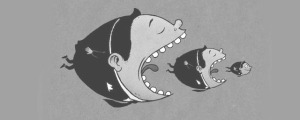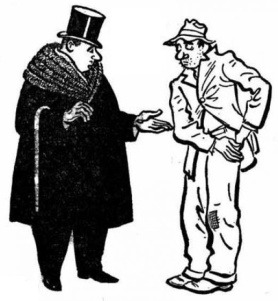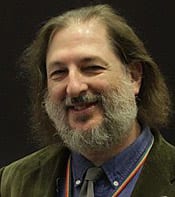The 10,000 year revolution
This essay is part of a series on cultural, scientific and esoteric matters.
 Eric Schechter
Eric Schechter
Paradise or Extinction
[dropcap]T[/dropcap]he climate apocalypse is coming bigger and faster than most people realize. It’s about to kill us all, as I’ll explain. We’re also threatened by poisons in our air, food, and water, and by the growing likelihood of nuclear war. But all these problems originate in the same malfunction of our culture; I’ll focus on the climate problem as it is most certain.
There are measures we could take to avert extinction, but we’re being stonewalled by our rulers, who are more concerned with short-term profits. Our governments and corporations can’t be reformed, and must be overthrown, because their idiocy is not superficial: It’s embedded in the fundamental design of our institutions. In fact, it’s in all of us, not just our rulers. It’s in our socioeconomic system, our culture, our way of seeing the world — as I’ll explain.
 To survive, we need a global awakening and metamorphosis, our biggest cultural change in 10,000 years, much bigger than a “revolution,” much deeper than just ending capitalism.
To survive, we need a global awakening and metamorphosis, our biggest cultural change in 10,000 years, much bigger than a “revolution,” much deeper than just ending capitalism.
That change, necessary to avert extinction, will also solve most of our other problems. We’ll awaken to a much better world than we had imagined was possible: a world where all are friends, everyone has enough, no one is on top, no one is left behind, and we plan the economy together for the best for everyone. I would describe that better world as paradise, but some religious people may interpret it as Rapture.
—
1. Our Imminent Doom
Global warming is a feedback loop: Some of its results are also causes. Consequently, the bigger it gets, the faster it grows and the harder it is to stop. That’s exponential acceleration, which I’ve graphed here in orange. It starts out small and slow; that’s the nearly horizontal portion at the left end of the curve. Eventually it grows large enough to be visible. Soon after that, it’s enormous and growing explosively; that’s the nearly vertical portion at the right end of the curve.
We’ve just entered the visible portion. Floods, droughts, crop failures, rising food prices, famines, mass migrations of refugees have already begun. If we continue on our present course, we’ll soon see the collapse of civilization, the end of any sort of organized human activity, I’d guess by 2030. At that point, most of humanity will die quickly (starting with the poor). Only a few preppers and billionaires will still survive. But it doesn’t stop at that point.
The few surviving humans might believe they can wait out the apocalypse. Preppers believe that Nature will heal herself once most humans are gone. Sorry, no such luck. Global warming was begun by human activities, but some of the feedback loops are now independent of human activities. For instance, the melting of ice lowers the planet’s reflectivity, and so speeds the warming.
Thus, even after civilization collapses, the planet will keep getting hotter, faster than plants and animals can adapt. Soon the entire ecosystem will collapse. Humans and nearly all other species will go extinct, I’d guess by 2040. The many headlines warning us of sea rise are missing the point.
—
2. Addressing the Climate Emergency
To avert extinction, we must try to halt global warming while that still might be possible, while we still have some organized capabilities, some civilization. We’d better hurry.
We’ll need to plant more trees, and build more solar panels and windmills. We’ll need to redesign all our products to be local, reusable, recyclable, organic, biodegradable, and carbon-neutral or carbon-negative. We’ll need to breed hardier phytoplankton and fund other kinds of climate-friendly research. We’ll need to ban industrial meat and other sources of methane. We’ll need to quickly phase out fossil fuels, long before we have enough renewable capacity to replace them; that means we’ll need rationing. We’ll need more telecommuting and more public transportation. We’ll need to retool all our infrastructure, all our industries; it will be a bigger change than the preparations for World War Two.
But all these changes are presently blocked by our socioeconomic system, so we’ll need to change that too. The obstruction is bipartisan, by the way: The Republicans say “never” but most of the Democrats say “later,” which amounts to the same thing.
Choose carefully among the climate rebellions: Some of them are promoting “Green Capitalism,” but that’s an oxymoron; any kind of capitalism is madness. And if Elon Musk escapes to Mars, he’ll bring the madness with him.
—
3. A History of Madness
For 300,000 years we lived as hunter-gatherers. The archaeological evidence suggests that we lived as equals, without hierarchy. We shared everything of importance, and claimed nothing as private property. That’s still who we are, genetically. Most of us like to cooperate whenever we can; that’s still basic human nature.
All our changes since then have been cultural. Our biggest cultural change was 10,000 years ago: We discovered agriculture, and we settled in villages and later in cities. And then we took a wrong turn: Urban life did not make hierarchy and property necessary, but it made them possible, and we unwisely adopted those institutions. And today most people still accept hierarchy and property, unaware of the great damage those institutions cause. It is difficult for people to see their own culture. It’s as invisible, unnoticed, unquestioned as the air we breathe.
 Hierarchy concentrates power into a tiny ruling class, which corrupts.
Hierarchy concentrates power into a tiny ruling class, which corrupts.
Property necessitates trade, which increases inequality and thus concentrates power too. The desire to acquire private wealth and power is incentive for all sorts of evils. Political and monetary power are to some degree interchangeable: Each can be used to acquire the other, and so business and government merge, despite any claims that they check each other. For 10,000 years we’ve had one plutocracyafter another; that means “rule by the rich.” Money is influence, so the only way to end rule by the wealthy class is to not have a wealthy class; that requires a different economic system.
Trade also has externalities, unmeasured side effects that are enormously destructive. One side effect is ecocide, which is now killing the whole world. Thus markets and competition really are not efficient.
 Despite rising productivity, most of us are experiencing hard times; the hardest hit can be seen begging on street corners. And property and competition separate us from one another, killing empathy, giving rise to racism, sexism, austerity, authoritarianism, war, bombings, shootings, and other cruelties.
Despite rising productivity, most of us are experiencing hard times; the hardest hit can be seen begging on street corners. And property and competition separate us from one another, killing empathy, giving rise to racism, sexism, austerity, authoritarianism, war, bombings, shootings, and other cruelties.
Those evils are inherent in any system of ruling and owning; they cannot be cured through regulations or reforms. And moderation is no solution; a little bit of capitalism is like a little bit of cancer. But hierarchy and property are deeply embedded in our culture; it is hard for us to imagine life without them. Getting rid of them will be an enormous change.
This culture of ruling and owning may have begun in the middle east (see Genesis 1:26). It spread by the sword, to cover most of the eastern hemisphere. Then Columbus brought it to the western hemisphere as well. Native Americans had occasionally seen a similar disease in individuals, and so they had a name for it: wetiko.
The current manifestation of property is capitalism, which has additional problems of its own. It cannot exist in a steady state, and so it is constantly disrupting people’s lives. A capitalist system must grow at least 3% per year, or else it will collapse into recession or depression. But the planet is not getting any bigger, so “sustainable growth” is an oxymoron. Eventually the system will collapse; but will it take us all down with it?
Hierarchy and property could have continued tormenting us for millennia more, but around 300 years ago things got even worse: We invented modern science, and began developing modern technology. That magnifies all our capabilities for good or ill. It has been mostly ill because, steered by wetiko, we have used technology unwisely. Technology is now poisoning our planet, while arming madmen high and low with terrible weapons. The countdown clock is ticking: We must end this socioeconomic system soon, or it will end us.
A cultural change can’t be imposed by law or force. It only occurs voluntarily, when people see their old culture more clearly.
—
4. A World of Lies
 We’re surrounded by lies, especially here in the USA. Nothing is as it appears. The 1999 film “The Matrix,” though depicting a different set of lies, dramatizes how extreme can be the disconnect between what we see and reality. But in that film, the lies are imposed on people physically. Here in our own world, the lies are only imposed culturally: People see what they are taught to see.
We’re surrounded by lies, especially here in the USA. Nothing is as it appears. The 1999 film “The Matrix,” though depicting a different set of lies, dramatizes how extreme can be the disconnect between what we see and reality. But in that film, the lies are imposed on people physically. Here in our own world, the lies are only imposed culturally: People see what they are taught to see.
Some people have seen a little of the truth, and think they’ve seen it all. They glibly call themselves “woke,” and they may stop looking further. These people may be the hardest to awaken.
 For instance, some activists blame all our problems on the Federal Reserve or other aspects of our monetary system, which makes a few rich men richer at everyone else’s expense. If only those activists would keep looking, they’d discover that every part of any market-based economy makes a few rich men richer at everyone else’s expense. Trade — for labor, food, rent, whatever — increases inequality, by giving greater benefit to whichever trader was already in the stronger bargaining position.
For instance, some activists blame all our problems on the Federal Reserve or other aspects of our monetary system, which makes a few rich men richer at everyone else’s expense. If only those activists would keep looking, they’d discover that every part of any market-based economy makes a few rich men richer at everyone else’s expense. Trade — for labor, food, rent, whatever — increases inequality, by giving greater benefit to whichever trader was already in the stronger bargaining position.
 Corporate news is full of lies, supporting both major parties. And even our entertainment is full of lies, in the background assumptions implicit in every fiction. Television dramas show little of the desperation of our real lives, as we struggle to hold onto jobs we hate. Television and movies depict the military, police, FBI, CIA, etc., as our protectors, while in real life they are actually authoritarians protecting the rich and powerful.
Corporate news is full of lies, supporting both major parties. And even our entertainment is full of lies, in the background assumptions implicit in every fiction. Television dramas show little of the desperation of our real lives, as we struggle to hold onto jobs we hate. Television and movies depict the military, police, FBI, CIA, etc., as our protectors, while in real life they are actually authoritarians protecting the rich and powerful.
Our history books depict the USA as a brave land of freedom, but really the USA has been a plutocracy thinly disguised as a democracy ever since its “founding” in land theft, genocide, and slavery. Statistics show that the rich get the public policies they want and the rest of us don’t, regardless of elections.
 In the novel “1984,” the military branch of the totalitarian government is called the “Ministry of Peace.” Shortly after that book was published, the US War Department was renamed as the “Defense” Department, but it has nothing to do with defense. Rather, it is all about profitable weapons sales, the theft of resources, and the destruction of market rivals and political independents. The name change has fooled many Americans into believing that their military is on the right side of every war, but in fact our military has been routinely propping up dictatorships and overthrowing democracies that posed no threat to us, wherever this suited the owners of our government. Over half our federal budget is spent on wars, all based on lies, all making a few rich men richer at everyone else’s expense. Our honored statesmen of both major parties really are liars, thieves, and mass murderers.
In the novel “1984,” the military branch of the totalitarian government is called the “Ministry of Peace.” Shortly after that book was published, the US War Department was renamed as the “Defense” Department, but it has nothing to do with defense. Rather, it is all about profitable weapons sales, the theft of resources, and the destruction of market rivals and political independents. The name change has fooled many Americans into believing that their military is on the right side of every war, but in fact our military has been routinely propping up dictatorships and overthrowing democracies that posed no threat to us, wherever this suited the owners of our government. Over half our federal budget is spent on wars, all based on lies, all making a few rich men richer at everyone else’s expense. Our honored statesmen of both major parties really are liars, thieves, and mass murderers.
—
5. Plutocrats and Climate Change
The ruling class is not on our side, and this is particularly evident regarding the climate apocalypse. For half a century oil companies have been lying about global warming. Thirty years ago President George H. W. Bush was concealing scientist James Hanson’s climate reports. A few years ago, when the Arctic started melting, that should have been a wake-up call to ban fossil fuels, but instead our rulers began planning to extract fossil fuels from the Arctic.
The attitude of the ruling class toward the climate apocalypse is puzzling. After all, they are destroying the world that makes them rich, and they are destroying the future of everyone including themselves and their own children. I’m not sure why they are doing that, but I can suggest a few possible explanations:
- First of all, you have to understand that a few of the plutocrats are making immense profits from fossil fuels.
- Maybe some of the plutocrats figure that they won’t live long enough to see the end anyway, and they don’t care about their own children. They are sociopaths who only care about enjoying fabulous wealth for themselves in the here and now.
- Climate activist Bill McKibben explained that the oil companies need to leave most of their proven reserves in the ground. He may have overlooked the fact that in our current economic system, a corporation cannot simply walk away from most of its assets. We must distinguish between a corporation and its employees. If a corporate manager says “we shouldn’t be making a profit this way, it’s bad for the world,” he will just be fired.
- In the past, the plutocrats’ wealth has protected them from the consequences of their actions, and they believe that will happen again. They believe they can hide in a luxury underground bunker, wait out the climate apocalypse, and then come out again when all the fuss is over. (They’re mistaken.)
- Finally, politicians are a bit lacking in imagination. The changes we need for combating global warming are bigger than anything the politicians can imagine to be possible. And they don’t want the embarrassment of introducing impossible legislation.
—
6. A Better World
 It doesn’t have to be this way. We can have a world where we’re all friends and no one is left behind, where everyone has enough, and we all plan for the future together. We just have to replace hierarchy and property with horizontalism and sharing, respectively.
It doesn’t have to be this way. We can have a world where we’re all friends and no one is left behind, where everyone has enough, and we all plan for the future together. We just have to replace hierarchy and property with horizontalism and sharing, respectively.
The first step is to talk about all of this, and get more people to understand it. Feel free to write your own essay, or hand out copies of mine. My latest revision is at http://LeftyMathProf.org. You can find the transcript of this talk there, including links to related materials.
The second step is to “get organized” for some sort of “bigger-than-revolution.” I’m less clear on what that means, so this essay is still somewhat incomplete. I need to learn more about horizontal networking; I’m including a few links on that subject in the transcript for this talk:
- https://blog.p2pfoundation.net/patterns-for-decentralised-organising-richard-d-barlett-and-natalia-lombardo-intersection18/2019/05/04
- http://theanarchistlibrary.org/library/peter-gelderloos-anarchy-works
- https://theleaderlessrevolution.com/
Good luck to us all. Viva la revolución.
—
2019 June 7, version 4.41. Links to section headings: 1. Our Imminent Doom. 2. Addressing the Climate Emergency. 3. A History of Madness. 4. A World of Lies. 5. Plutocrats and Climate Change. 6. A Better World.

This work is licensed under a Creative Commons Attribution-NonCommercial 4.0 International License

